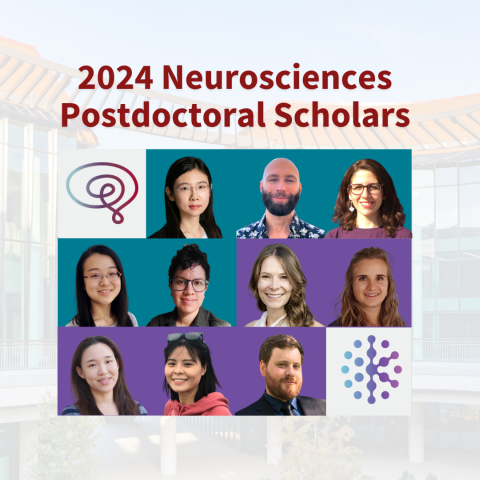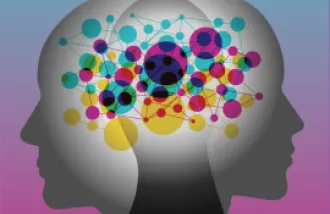Ten young scientists pursuing novel, multi-disciplinary approaches to understanding the workings of the mind and brain have been named to the 10th cohort of Neurosciences Postdoctoral Scholars.
"For nearly a decade, these awards have brought researchers together, bridging the gap across disciplines and unlocking new tools and knowledge about brain function," said Miriam B. Goodman, the Mrs. George A. Winzer Professor of Cell Biology and chair in the Department of Molecular and Cellular Physiology, who founded the program at the Wu Tsai Neurosciences Institute in 2015.
Originally named the Interdisciplinary Scholars Program for its focus on supporting young researchers at the intersections of different fields, this program expanded in 2023 to include an additional “brain resilience” track for scholars focused on the science of neurodegeneration and healthy aging, supported by the Knight Initiative for Brain Resilience, based within the Institute.
“It has been such a pleasure over the past year to see scholars from the two tracks interact," said Liqun Luo, co-director of the program. “We look forward to our new cohorts from both programs, who will surely bring in a lot of new energy to our community.”
“Witnessing the vibrant exchange of ideas and integration with the Interdisciplinary Scholars Program has been truly gratifying,” added Natasha Hussain, associate director of the Knight Initiative for Brain Resilience, “This unique interaction is building a community of support, with valuable feedback and critique empowering scholars to refine their projects and approach research in novel ways.”
In addition to two years of research funding, the program fosters a community of scholars past and present, who meet regularly to discuss their research and learn from one another’s experiences. This inclusive approach fosters innovation at the crossroads of various disciplines and creates a supportive community for postdocs to share challenges, successes, and perspectives. As Goodman noted, "Our scholars are all remarkable scientists with exciting interdisciplinary research plans, but they are also selected for their potential to form a diverse and supportive intellectual community."
Brain Resilience Scholars also participate in programming intended to foster community specifically around the topics of brain aging and resilience, led by Natasha Hussain and Elizabeth Mormino, an assistant professor of neurology studying brain aging through imaging and genetics.
"The Brain Resilience Postdoctoral Scholar Award has created an enriching community of scholars that have positively impacted my research and encouraged my interest in studying the aging brain,” said Ravi Nath, a member of the inaugural Brain Resilience Postdoctoral Scholar cohort.
“The award has been instrumental in advancing my neuroscience research project to understand circadian regulation of oligodendroglia,” added Daniela Rojo Capitanio, another member of the inaugural Brain Resilience Postdoctoral Scholar cohort. “The financial support provided by the award has allowed me to conduct experiments crucial for the progression of my work and attend collaborators labs.”
The intellectual richness that arises from the convergence of scholars' diverse research pursuits is inspiring, said Zulema Garibo Gonzalez, who coordinates the Wu Tsai Neurosciences Institute's training and fellowship programs.
“In my role, I have a front-row seat to the fascinating and varied realms of research our scholars are exploring," Garibo said. "The depth and breadth of research within our Neuroscience community is such a joy to witness.”
Meet our 2024 postdoctoral scholars and learn about their projects
Interdisciplinary Scholars
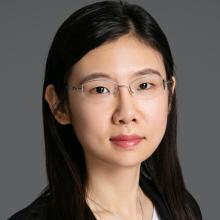
Xiao Yang
Project: Multifunctional vascular-like electronics for integration and monitoring of human neural organoids
Advisors:
Bianxiao Cui (Primary sponsor; Chemistry)
Sergiu P Pasca (Co-sponsor; Psychiatry)
Xiao Yang is a postdoctoral scholar working jointly in the laboratories of Professor Bianxiao Cui in the Department of Chemistry and Professor Sergiu P. Pașca in the Department of Psychiatry and Behavioral Sciences. Yang has been tackling a grand challenge in the field of human brain organoids: the unmet need for a long-term, minimally invasive brain-machine interface that allows for chronic interrogation of organoids in suspension without interfering with their 3D organization and differentiation. This platform holds significant promise in uncovering disease phenotypes and activity patterns underlying the assembly of the nervous system.
Yang received her Ph.D. in chemistry from Harvard University. With training in nanobioelectronics during her Ph.D. and a profound passion for extending its biomedical impact, Yang aims to develop innovative nanobioelectronics in deciphering complex questions in human brain development and disorders for her postdoctoral studies.
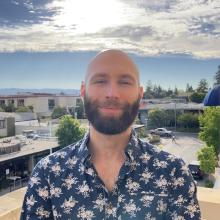
Blake Laham
Project: Neuronal innervation dynamics in uterine function and maternal age-associated miscarriage
Advisors:
Anne Brunet (Primary sponsor; Genetics)
Julia Kaltschmidt (Co-sponsor; Neurosurgery)
Blake Laham is a postdoctoral scholar working with Professor Anne Brunet in the Department of Genetics and Julia Kaltschmidt, a faculty scholar with the Institute. Laham received his PhD in Neuroscience from Princeton University where he worked with Professor Elizabeth Gould studying the interaction between early life experience, hippocampal plasticity, and emotional regulation. In his postdoctoral work, Laham is bridging concepts across neuroscience, molecular biology, and embryology in an attempt to reduce miscarriage rates and extend reproductive longevity.
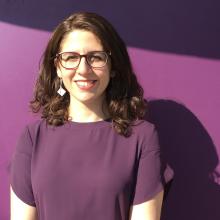
Najva Akbari
Project: How do early life experiences shape the neural underpinnings of caregiver olfactory recognition?
Advisors:
Lauren O'Connell (Primary sponsor; Biology)
Mark Schnitzer (Co-sponsor; Biology, Applied Physics)
Najva Akbari is an optical scientist investigating how the brain initiates complex social behaviors using novel microscopy approaches. As a postdoctoral fellow in Lauren O'Connell’s lab, she is identifying the neural mechanism of olfactory caregiver recognition in neonatal vertebrate brains using multiphoton microscopy in social poison frog tadpoles.
Akbari received her BS and MS in Electrical Engineering from UCLA. She completed her PhD in applied and engineering physics with Chris Xu at Cornell University. Her doctoral work focused on characterization of three-photon microscopy and applications of multiphoton microscopy to imaging small aquatic vertebrate brains such as adult zebrafish and Danionella.
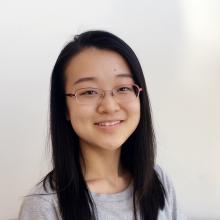
Zihui Zhang
Advisors:
Robert C Malenka (Primary sponsor; Psychiatry and Behavioral Sciences)
Neir Eshel (Co-sponsor; Psychiatry and Behavioral Sciences)
Zihui Zhang is a neuroscientist and engineer interested in using optical methods to study neural circuits. As a postdoctoral fellow with Professor Robert Malenka and Professor Neir Eshel, she investigates how serotonin and dopamine modulate downstream neurons to regulate reward-seeking and aggression.
Zhang obtained her PhD at University College London, developing techniques for closed-loop manipulation of individual neurons in vivo using holograms. She further applied these tools to discover how neurons in the primary sensory cortex are engaged in sensory perception and decision-making.
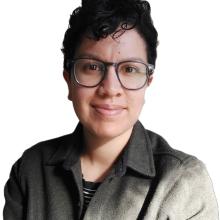
Selin Jessa
Advisors:
William J Greenleaf (Primary sponsor; Genetics)
Anshul B Kundaje (Co-sponsor; Genetics, Computer Science)
Selin Jessa is a computational biologist interested in the genetic regulation underpinning brain development, and how these processes are perturbed in disease. As a postdoctoral fellow in the labs of William Greenleaf and Anshul Kundaje, she is applying deep learning methods to large-scale single-cell transcriptomic and epigenetic datasets in the context of normal fetal development, as well as neurodevelopmental and neuropsychiatric disorders, to study the logic of cis and trans gene regulation.
Jessa's previous work as a graduate student in Claudia Kleinman's laboratory at McGill University focused on identifying candidate cells-of-origin in several subtypes of deadly pediatric brain tumors. Jessa is also an advocate for scientific reproducibility and data sharing in genomics and has developed tutorials, resources, and code repositories to promote bioinformatics reproducibility.
Brain Resilience Scholars
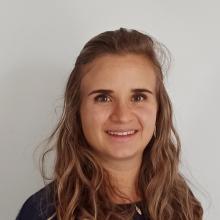
Eloise Berson
Project: High-resolution profiling of Alzheimer’s brain resilience
Advisors:
Thomas Montine (Primary sponsor; Pathology)
Nima Aghaeepour (Co-sponsor; Anesthesiology, Perioperative and Pain Medicine, Pediatrics)
Eloise Berson is a jointly appointed postdoctoral fellow, advised by Montine and Nima Aghaeepour. She earned her Ph.D. in computer graphics from the University of Paris-Saclay, with her doctoral research focusing on developing AI algorithms to enhance 3D facial animation editing. Currently, Berson is working on developing new AI methods to analyze and interpret high-dimensional spatial omic data, aiming to identify molecular, morphological, and imaging signatures of resilience to Alzheimer's disease.

Hannah Ennerfelt
Project: TREM1 in peripheral myeloid cells exacerbates cognitive decline in aging and Alzheimer's disease
Advisors:
Katrin I Andreasson (Primary sponsor; Neurology)
Hannah Ennerfelt aims to understand how the immune system contributes to neurodegeneration. As a postdoctoral fellow advised by Katrin Andreasson, she researches the mechanisms by which immune cells drive Alzheimer’s disease and cognitive aging.
Ennerfelt received her bachelor’s degrees in biology and psychology from Salisbury University. She began her studies in neuroimmunology as a Fulbright fellow at Uppsala University in Sweden. Hannah then obtained her Ph.D. in neuroscience in the lab of John Lukens at the University of Virginia where she studied cell signaling pathways that instruct the diverse roles microglia play in neurodegenerative diseases.
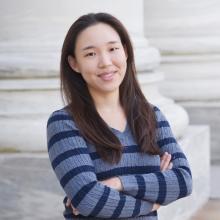
Sonia Nan Kim
Project: Evaluating the immunomodulatory role of circular RNAs in microglia
Advisors:
Howard Y Chang (Primary sponsor; Dermatology, Genetics)
Thomas Montine (Co-sponsor; Pathology)
Sonia Nan Kim is a neuroscientist working to develop new RNA tools and therapeutics for neurodegenerative disease. As a postdoctoral fellow in Howard Y. Chang’s group, she is studying applications of RNA biology — specifically circular RNAs — to address changes in immunomodulatory activity in neurodegenerative disease.
Sonia Nan Kim received her B.S. in molecular biology, and M.S. in biology from the University of California - San Diego with Lawrence S.B. Goldstein. She received her Ph.D. in biological and biomedical sciences from Harvard University. In her doctoral research with Christopher A. Walsh at Boston Children’s Hospital, she used somatic mutations as lineage markers to generate a comprehensive map of the clonal structure of the human cortex in relation to major neuronal cell types and major cytoarchitectonic regions across the brain.
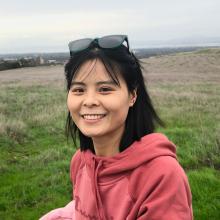
Jintao Sheng
Project: Neural mechanisms of episodic memory resilience in longitudinal aging brains
Advisors:
Anthony D Wagner (Primary sponsor; Psychology)
Elizabeth Mormino (Co-sponsor; Neurology)
Jintao Sheng is a Postdoctoral Fellow in the Department of Psychology working with Anthony Wagner and Elizabeth Mormino on the Stanford Aging and Memory Study (SAMS). Specifically, her work explores the underlying neural mechanisms of age-related memory decline by using multimodal neuroimaging designs.
Sheng completed her PhD in Cognitive Neuroscience at Beijing Normal University, under the supervision of Gui Xue. During her PhD, Jintao used cutting-edge methods in neuroimaging and focused on the neural mechanisms of human episodic memory encoding from the perspective of neural representations across materials, individuals, and functional networks in healthy young adults.
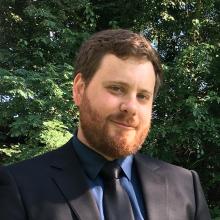
Jacob Simon
Project: Sleep and neuronal energy management in neurodegeneration
Advisors:
Thom Clandinin (Primary sponsor; Neurobiology)
Jacob Simon is a postdoctoral scholar in the Clandinin lab working to understand the molecular functions of sleep, and why sleep is so important for brain health. He is using genetic and neuroimaging methods to explore how neurons regulate energy usage during sleep using fruit flies as a model system.
Simon studied Physics and Molecular and Cell Biology at UC Berkeley before completing his graduate work in Biological Engineering at MIT with Alan Jasanoff where he engineered molecular sensors for functional MRI. When he's not in the lab, you'll find Jacob working on one of his many hobbies which include home brewing and coffee roasting.
Learn more about the Neurosciences Postdoctoral Scholar Awards


